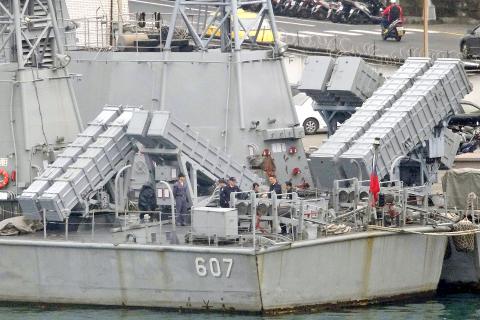Top government officials and military command centers yesterday closely monitored the passage of Chinese aircraft carrier the Liaoning and escort warships as the fleet passed through the Taiwan Strait, sending reports to President Tsai Ing-wen (蔡英文).
The vessels were expected to exit Taiwan’s air defense identification zone after press time last night.
Tsai, who is on a nine-day state visit to Central America, conferred with top military and national security officials on the Liaoning’s passage through the Taiwan Strait, speaking via telephone with National Security Council Deputy Secretary-General Chen Chun-ling (陳俊麟) and Minister of National Defense Feng Shih-kuang (馮世寬) yesterday morning.

Photo: AFP
Presidential Office spokesman Alex Huang (黃重諺) said Tsai made the calls upon her return to her hotel in Managua after attending Nicaraguan President Daniel Ortega’s inauguration ceremony.
“Tsai instructed the council and the Ministry of National Defense to closely monitor developments and to stand by contingency plans to reassure the public that they can relax,” Huang said, adding that the president was satisfied with monitoring and mobilization efforts by the agencies.
Huang said that even before Tsai’s departure, government ministries had activated deployment and contingency plans to enable the comprehensive tracking and surveillance of the fleet’s movement, location and weapons deployment.
Earlier yesterday, ministry officials said the carrier group did not intrude into Taiwan’s territorial waters, but it entered the nation’s air defense identification zone from the southwest, sailing northward, at about 7am.
The Liaoning and its escort vessels kept to the Chinese side, west of the median line of the Taiwan Strait, with passage estimated to take more than 10 hours.
It was expected to leave the zone late last night, ministry spokesman Major General Chen Chung-chi (陳中吉) said.
Defense forces deployed F-16s, Indigenous Defense Fighter jets, P-3C surveillance aircraft and frigates to monitor and track the Chinese warships’ movements.
The Liaoning conducted naval exercises in the South China Sea, with its squadron of 15 Shenyang J-15 aircraft and had seven escort vessels, including three missile cruisers.
A high-ranking military official was quoted in reports as saying that the ministry had contingency plans and was prepared for missile strikes targeting the carrier group if the vessels had crossed the median line, trespassing in Taiwan’s territorial waters.
A combination of Taiwan’s locally developed Hsiung Feng II and Hsiung Feng III missiles, if deployed in successive waves of attacks, could overwhelm the defensive systems of the carrier group, said the official, who declined to be named.
Chang Cheng (張誠), a retired engineer who helped to develop the Hsiung Feng III missiles at the nation’s main defense research center, agreed with the assessment.
“I have no doubt that our Hsiung Feng III missiles could do the job,” Chang said, adding that the supersonic missiles have earned the nickname “aircraft carrier killers” and can reach 2.5 to 3 times the speed of sound.

In his National Day Rally speech on Sunday, Singaporean Prime Minister Lawrence Wong (黃循財) quoted the Taiwanese song One Small Umbrella (一支小雨傘) to describe his nation’s situation. Wong’s use of such a song shows Singapore’s familiarity with Taiwan’s culture and is a perfect reflection of exchanges between the two nations, Representative to Singapore Tung Chen-yuan (童振源) said yesterday in a post on Facebook. Wong quoted the song, saying: “As the rain gets heavier, I will take care of you, and you,” in Mandarin, using it as a metaphor for Singaporeans coming together to face challenges. Other Singaporean politicians have also used Taiwanese songs

NORTHERN STRIKE: Taiwanese military personnel have been training ‘in strategic and tactical battle operations’ in Michigan, a former US diplomat said More than 500 Taiwanese troops participated in this year’s Northern Strike military exercise held at Lake Michigan by the US, a Pentagon-run news outlet reported yesterday. The Michigan National Guard-sponsored drill involved 7,500 military personnel from 36 nations and territories around the world, the Stars and Stripes said. This year’s edition of Northern Strike, which concluded on Sunday, simulated a war in the Indo-Pacific region in a departure from its traditional European focus, it said. The change indicated a greater shift in the US armed forces’ attention to a potential conflict in Asia, it added. Citing a briefing by a Michigan National Guard senior

CHIPMAKING INVESTMENT: J.W. Kuo told legislators that Department of Investment Review approval would be needed were Washington to seek a TSMC board seat Minister of Economic Affairs J.W. Kuo (郭智輝) yesterday said he received information about a possible US government investment in Taiwan Semiconductor Manufacturing Co (TSMC, 台積電) and an assessment of the possible effect on the firm requires further discussion. If the US were to invest in TSMC, the plan would need to be reviewed by the Department of Investment Review, Kuo told reporters ahead of a hearing of the legislature’s Economics Committee. Kuo’s remarks came after US Secretary of Commerce Howard Lutnick on Tuesday said that the US government is looking into the federal government taking equity stakes in computer chip manufacturers that

CLAMPING DOWN: At the preliminary stage on Jan. 1 next year, only core personnel of the military, the civil service and public schools would be subject to inspections Regular checks are to be conducted from next year to clamp down on military personnel, civil servants and public-school teachers with Chinese citizenship or Chinese household registration, the Mainland Affairs Council (MAC) said yesterday. Article 9-1 of the Act Governing Relations Between the People of the Taiwan Area and the Mainland Area (臺灣地區與大陸地區人民關係條例) stipulates that Taiwanese who obtain Chinese household registration or a Chinese passport would be deprived of their Taiwanese citizenship and lose their right to work in the military, public service or public schools, it said. To identify and prevent the illegal employment of holders of Chinese ID cards or